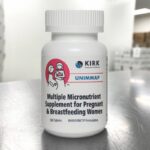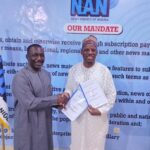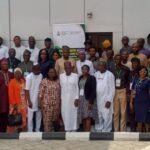By Ephraims Sheyin
Stakeholders have lauded the Federal Government for establishing the Ministry of Marine and Blue Economy and expressed optimism that it would widen the exploration of Nigeria’s coastal potential.
Some of them, who spoke with the News Agency of Nigeria (NAN), expressed hope that the ministry would revitalise the nation’s seaports and boost economic growth across the country.
They said that the new ministry had the capacity to generate more than $1.5 trillion per year and provide millions of jobs if the massive potentials in the marine industry were effectively utilised.
NAN reports that the blue economy involves all economic activities related to the oceans, the seas and the coasts.
It refers to the industries and societies that rely on oceans and waterways and involves economic sectors such as offshore wind energy, tourism, marine biotechnology, fishing, agriculture and transport.
Covering more than 70% of the earth’s surface, oceans and seas provide food, medicines, renewable energy, and natural resources to billions of people around the globe.
But to fully explore the potential of the maritime industry, Mr Ayotunde Bally, the Chief Executive Officer of Arvofinance, has urged stakeholders to adopt collaborative and innovative strategies to open it up.
Bally told NAN in Lagos that the impact the new ministry would be felt if there are huge investments in port infrastructure, shipbuilding facilities, and coastal management systems.
“Such investments are crucial for enhancing the competitiveness and efficiency of Nigeria’s maritime sector,” he said.
He said that upgrading existing ports, establishing new ones, and improving connectivity would attract international trade and stimulate economic growth.
The financial expert emphasised the need to encourage the development of maritime skills through vocational training programmes and educational initiatives.
“Collaborating with educational institutions and industry experts will help create a skilled workforce capable of driving innovation and competitiveness within the industry.
“Promoting collaboration between the government, private sector, and international organisations will facilitate innovation, attract investment, and foster technology transfer.
“Public-private partnerships can enable the sharing of resources, expertise and best practices, ultimately fueling the sustainable growth of the maritime industry.”
He called for a reduction in bureaucratic barriers, while ensuring transparency to create an enabling business environment for stakeholders.
Bally said that implementing clear and fair regulatory frameworks would help Nigeria to attract domestic and foreign investments, fostering a vibrant and thriving maritime industry.
“We must also invest in research and development initiatives to unlock new opportunities within the blue economy,” he said.
He added that encouraging collaborations among universities, research institutions and industry players would foster the development of cutting-edge technologies and solutions.
“The creation of the ministry signifies a pivotal shift in the country’s approach toward harnessing the immense potential of its coastal resources.
“This strategic decision demonstrates government’s recognition of the significant economic opportunities inherent in the maritime industry.”
According to him, the impact of the ministry on Nigeria’s economy is expected to be far-reaching as it will facilitate economic diversification and reduce the nation’s reliance on oil as the primary revenue source.
He noted that the maritime industry encompasses a wide range of sectors, including shipping, fisheries, aquaculture, tourism, and offshore exploration, offering a plethora of avenues for economic growth and job creation.
“Moreover, the ministry’s focus on sustainable practices will ensure the responsible utilisation and preservation of marine resources.
“By promoting sustainable fishing methods, safeguarding marine ecosystems and supporting eco-friendly tourism initiatives, Nigeria can attract international investments and position itself as a global leader in sustainable blue economy practices,” he added.
Ms Funmi Folorunso, Secretary General, African Shipowners, said that the African Blue Economy Strategy had been applauded worldwide as an economic tool that should be embraced by all.
Folorunso added that the creation of a ministry dedicated to it was a clear indication of purposeful leadership ready to optimise the potentials of the blue economy for Nigeria.
“As a country, we must list what these potentials are, prioritise areas we want to work at, and dedicate human and financial resources to it.”
Another stakeholder, Rev Jonathan Nicole, former President, Shippers Association of Lagos State (SALS), told NAN that government should re-introduce workable economic policies that would attract investors and protect their investment for the ministry to impact the economy.
According to Nicole, policies should help streamline the processes of quality investment and its sustainability and also ensure a balanced trade platform.
“Government should replace the survival of the fittest situation which breeds harsh government policies, especially with the Nigeria Customs Service, where goods are more treasured than human lives.
“For shipping, Nigeria has no alternative for now than to rely on foreign shipping lines for movement of goods and services.
“Government should introduce the shipping policy that makes it mandatory for owners of vessels to fund their local agents, as it used to be. This will stop local shipping costs.
“The shipping policy should be broad enough to provide the step by step requirements in Shipping trade in Nigeria,” he said.
Nicole said that the evolution of shipping business would expand the Nigeria’s scope of getting modern vessels for ferries and other cross border trade through sea routes.
He suggested that all ports should be identified with one regular trade movements like Timber in Sapele Port, fisheries in Koko, while Warri Port may be the main port with navigable draughts, handling containers and general Cargo.
Nicole added that the Benin Gelegele Port should be developed to link up with the Sea which was not too far away as it could handle exports from the North and some aspects of export cargo from the East.
He urged that there should be a realistic inter-government forum to reduce the cost of cargo clearance, re-structure the Nigeria Customs Tariff into an acceptable documents, that even the smugglers would be glad to comply with.
Nicole noted that ocean was where shipping trade take place and if properly harnessed could generate over N7 trillion yearly through fisheries, coastal inter regional trade, oil and gas, seafaring and others.
“The ocean is magnanimous enough for supplying water steadily to all areas of existence and beyond. The pollution in our waters must be cleaned up. The areas of pollution should be cleaned up to allow aquatic life to survive.
“The blue economy will encourage clean drinking water for all, investments will be massive as tourism will blossom,” he said.
Mrs Eunice Ezeoke, President, Women’s International Shipping and Trading Association (WISTA), said the new ministry would pave way for new frontier of national economic development through Nigeria’s vast coastline of 853km and 200 nautical miles of Exclusive Economic Zone (EEZ).
She said Nigeria’s coastline was almost one-third of the nation’s landmass, adding that the ocean contributes an estimated 300 billion dollars to the African economy and support over 49 million jobs.
According to Ezeoke, Nigeria must key into this and ensure that the ocean and waterways resources plans must be incorporated into the Nigerian national developmental strategy.
“The new ministry is a commendable development and one in the right direction.
“It has given exposure to the non-oil sector of the economy for growth, expansion and will definitely highlight the many benefits accruable from the ocean resources, rivers, lakes and the waterways,” she said.
She, however, urged that the nation’s shipping approach must be sustainable with the use of the ocean resources for economic growth and well-being.
“There is need for a cohesive deliberate, strategic and sustainable development plan to map out the headway in order to optimise the potential at all levels of the spectrum.
“The new ministry will lead to infrastructural development of the sector in the area of job creation, draw attention and focus on technological developments, food productions and, of course, security must improve,” she said.
Ezeoke noted that growth was expected in the area of fishing, transportation of goods by waterways and store export as there would be emerging sectors such as marine biotechnology, deep sea mining, renewable energy and eco-tourism under the new ministry.
Meanwhile, experts and stakeholders in diverse aspects of the economy in Ondo, Ekiti and Osun have described the new ministry as a goldmine capable of turning around the nation’s economic fortune, if properly harnessed.
The stakeholders spoke with NAN in Osogbo, Ado-Ekiti, Akure and Okitipupa.
They said that the fund from the ministry could be channeled to other critical aspects of the economy to engender a rapid development of the country.
Mr Samuel Atiku, an economist, told NAN that the ocean and deep sea, with massive amount of opportunities ranging from aquaculture, fishing and tourism to transportation, are among the few sectors that have remained untapped.
Atiku, who said that the worth of sea food markets globally was about $160 billion between 2019 and 2020, observed that people had started projecting that the threshold of such markets would have risen to between $340 billion and $360 billion in 2027.
He said that Nigeria stands a good chance to generate a lot of sea funds for economic growth, “if the ministry is well coordinated”,
According to him, the ecosystem around the ocean, through proper monitoring, coordinating and supervision, will ensure a safety of marine life and protection of the oceanic edifice.
“I believe we are heading in the right direction, but we should look for experts in such field capable of handling and coordinating the ministry,” he said
Also speaking, Mr Adeagbo Ilesanmi, the Coordinator, Osun Networks of NGOs, said the new ministry would create more job opportunities, improve food security, tourism and infrastructure development, smart cities and ports like in other advance countries.
“Under the blue economy, the government could channel resources towards boosting marine trade, creating job opportunities for people in the marine sector, including importing and exporting.
“Maritime transport of international goods traded through sea routes is expected to grow with development of fisheries.
“It is also expected that the Federal Government’s interest in blue economy would enhance safety of the Nigerian waters and ease water transportation of goods and commodities.
“Stakeholders in the maritime sector have so much to look forward to, from the new ministry, as it could provide them with a platform to do their business with ease, attract foreign investments and have their businesses well secured,” he said.
But in Ekiti, the stakeholders, while commending government’s renewed focus on the maritime sector, expressed fears that the development might pose big threats to the environment.
Analysing itd economic benefits, a member of the Shippers Council of Nigeria, Mr Dele Oladayo, said the new ministry might end up being one of the most creative and innovative steps so far taken by the new administration.
According to him, the maritime industry, which has so much economic viability, has been under-utilised for years.
He said the creation of the special ministry would boost performance with the nation gaining high revenue yields and employment opportunities.
Also speaking on the ministry, a retired dock worker, Mr Kayode Morayo, who commended government for the initiative, urged it to deploy everything humanly possible, by way of heavy investment in the sector, for optimal results.
He explained that such would speed up the process of unearthing other potentials of the ocean to create more jobs and boost economies.
A development expert, Mr Lawrence Omoleye, said the creation of the new ministry, which he considered long overdue, would unlock new economic potentials.
According to him, there are new opportunities around us, especially in the country’s waters, and they include exploring the concept of blue economy.
“The blue economy is the sustainable use of ocean resources for economic growth, improved livelihoods and jobs while preserving the health of the ocean ecosystem.
“This ministry is long overdue considering our dwindling economic fortune and, more importantly, to support the diversification of the economy,” he said.
Speaking in the same vein, Mr Kunle Olaoye, a legal practitioner with bias for commercial law, said that marine-related investments would trigger sufficient blue growth in the country, considering its adequate marine resources that had remained untapped over the years.
He, however, advised the government to use the opportunity at hand to work out more strategies aimed at identifying the benefits of sustainable ocean economy that would enable the country use the marine resources without allowing it to affect the environment.
He said investing in the blue economy meant the unlocking of the potential of the ocean to create more jobs and boost the economy massively.
An economist, Dr Busuyi Adesina, said the creation of the ministry was a welcome development, stressing that it would boost the revenue generation drive of the country.
Adesina explained that aside from crude oil and agricultural produce exportation, other areas where the Federal Government could generate huge funds was from the sea.
“In a year, not enough billions of naira is generated from the sea, because the transportation and importation of cars and goods alone cannot return the huge investment of the country in the maritime sector.
“For the president to have created Ministry of Marine and Blue Economy to control all transactions and activities on the sea is a good step that would improve our economy tremendously.
“I believe the man in charge of the ministry, former Gov. Gboyega Oyetola, will do a good job by flushing out every corrupt individual in the sector to ensure that the desired objectives of creating the ministry is achieved,” he said.
However, the duo of Mrs Kikelomo Sunday and Mr Omoseebi Ogunyemi, both environmentalists, have expressed concerns over the creation of the Marine and Blue Economy Ministry.
In their view, the development only showed alleged government’s disregard for the environment as it gives way for continuation of gas emissions which is a major cause of climate change and its attendant problems faced by different communities.
“The new ministry will cause a lot of problems for the aquatic ecosystems and complicate the plight of communities whose interests are to be jeopardised,” Ogunyemi fumed.
Also, a public affairs analyst and member of the Civil Society Organisations, Mr Bode Ilesanmi, said although the concept of blue economy was aimed at massive exploitation and commodification of natural resources, especially the waterways, it will deny local fishermen and women their means of livelihood.
Dr. Yemi Okunuga, a senior lecturer at the Engineering Department, Olusegun Agagu University of Science and Technology (OAUSTECH), Okitipupa, while hailing the new ministry, expressed conviction that it would revamp the nation’s economy.
Okunuga said that Nigeria had been operating a mixed economy with the maritime industry as a major sector but without the much desired dividends.
The don described maritime and blue economy as a new opening of a goldmine that had been bringing more fortunes and investment opportunities to countries that had ventured into the new phenomenon.
Okunuga said the introduction of the new ministry, considering the country’s status as a major oil producing and exporting country in the world, would open more untapped potential in the maritime industry.
He added that the blue economy could lead to job creation, improved food security, tourism and infrastructural development, green energy, smart cities and ports, among others, when properly harnessed through enabling policy frameworks.
“It’s indeed a good thing for President Tinubu to have created this ministry; it will surely shore up the nation’s revenue generation if properly harnessed through enabling policy framework.
“The blue economy has enormous potential for renewable energy from wind, tides and waves, all of which require technology to capture sustainably,” Okunuga said
Also speaking with NAN in Akure, Mr Alo Martins, Executive Director, Upline Centre for Development (UCD), who said that the world had moved from the era of petroleum to adopting marine economy, appealed to the Federal Government to build the foundation of the ministry with knowledgeable people.
According to him, the nation’s economy is shrinking because it doesn’t have enough products that could be exported.
“Today, the source of wealth of most western nations is hinged on marine economy.This is a good ministry to come up with, and it needs to be launched with full knowledge for it to support our economy.
“It has become imperative for the Federal Government to shun nepotism and favouritism by sourcing for the right and knowledgeable people. The government should endeavour to put the right peg in the right spots.
“I see this ministry as another economic hub for the country at large if it is handled by the competent people.
“If the foundation of the ministry can be really designed with people of high intellectual capacity, what we are realising as revenue from oil will be a peanut when compared with what will be generated from the ministry,” Martins said.
Martins, therefore, called on all stakeholders to maximise the potential of the new ministry by supporting the Federal Government totally.
Martins, who said that Ondo State would be one of the beneficiaries of the marine economy, called on the state government to expedite actions on the establishment of the seaport in the state.
“Our coast is supposed to have been on ground by now to reduce the pressure on Lagos port because our shore here is deeper than what we have in Lagos,” he said. (NAN)(www.nannews.ng)
Edited by Ephraims Sheyin













Great piece !